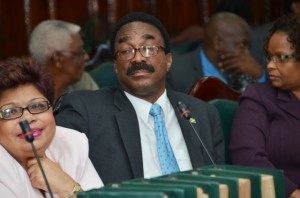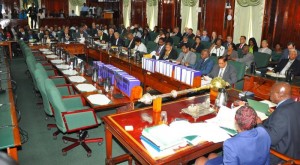AML Bill passed in National Assembly
By Jomo Paul
[www.inewsguyana.com] – After close to three years in the National Assembly, the Anti-Money Laundering and Countering the Financing of Terrorism Bill (AML/CFT) 2015 was passed in the House on Friday, June 26 in the absence of the People’s Progressive Party/Civic (PPP/C) opposition.
The Bill was presented to the house on Thursday, June 25 for its first reading by Attorney General, Basil Williams and read for the second time on Friday, where it attracted the support of all 33 members of Parliament on the government side.
The contentious piece of legislation will now be signed into law by President David Granger. Williams told the House that the Bill has had a “checkered history in this house,” but it is now time that Guyana moves on.
He addressed criticisms of the Bill by the PPP/C which was absent from the House on Friday. The Opposition had stated that the Bill does not conform to the guidelines set out by the Financial Action Task Force (FATF), while noting that several lacunae and excessive were listed within the amendments to the 2009
The APNU+AFC made additional amendments to the Bill, including Sections 8 & 9 which deals with the establishment of an AML/CFT Authority from which members will be appointed by the National Assembly, and removing the powers of the Minister to appoint the Director of the Financial Intelligence Unit (FIU) and the power of the President to dismiss the Director and placing these powers in the Authority.
“The members of the Opposition, who it would appear are waiting anxiously for us to pass this Bill without them…The main changes that we had proposed to the parent Act related to the governance…I don’t know where the criticism comes from that 65 persons cannot be better than one person,” said AG Williams on Friday.
He maintained that the process to now overlook the Financial Intelligence Unit (FIU) is transparent and would actually serve for the betterment of the unit, contrary to what is being said by the PPP.
“I don’t know where you can find a more transparent process than that…This authority (Parliamentary Management Authority) is not intended to rob the FIU of their independence, in fact the legislation states clearly that the authority will not interfere in the day to day runnings of the FIU,” Williams pointed out.
In the new Bill, Clause 17 inserts a new section – 37A in the Principal Act to provide that a police officer, a customs officer or a person authorised by the Director of the Financial Intelligence Unit may seize and detain cash anywhere in Guyana where the amount is more than ten million dollars.
It also stated that this is done when authorities have reasonable grounds for suspecting, for instance, that the currency is derived from a serious offence or is involved in money laundering or terrorist financing.
At the moment, by law, a person is only allowed to have $2M on his person; however this stipulation is widely ignored. Former Attorney General Nandlall told iNews on Wednesday, June 24 that the amendment places upon the citizenry an undue burden of establishing that their money is not the proceeds of money laundering or crime
But according to Williams, before law enforcement acts in such a manner they would have to be strapped with evidence of a wrongdoing.
“They cannot seize cash from persons in the process of business, commerce, trade or such activity…they have to be armed with information with evidence given to them by FIU and SOCU – so if anyone is approached it must be that they are armed with that evidence,” said the Attorney General.
“If they made a whimsical detention and seizure then they cannot be spared, they will be exposed; it is malicious prosecution,” he added.


